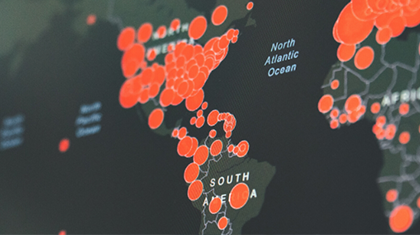Steven G. Ullmann, Chair and Professor, Health Management and Policy at Miami Herbert Business School, discussed the characteristics of the virus, as well as areas particularly challenging in the United States. With the number of confirmed cases rising in the region, these are areas in which Latin American and Caribbean nations may better prepare themselves to handle:
- Simultaneous asymptomatic and contagious, as well as a lengthy contagious period
- Limitation and cost of tests and personal protective equipment (PPE)
- Shortage of healthcare professionals – due to quarantine or childcare demands
- Impact on other areas of medicine
- Ethical questions, including distributional justice (“medical utility” vs “prospect for success”)
Click here to see the presentation by Dr. Ullmann.
Paulo Leme, Lecturer in Finance at Miami Herbert and former CEO and chairman of Goldman Sachs Brazil, delivered a presentation on the impact of COVID-19 on global financial markets, with a focus on Latin America and the Caribbean. With uncertainty categorizing most aspects of COVID-19, the market movement suggests a profound global recession marked by growing unemployment and decreasing growth in the short term. For the nations of Latin America and the Caribbean, growth rates will contract significantly in 2020, which will test the region’s already strained social and political climate.
Manuel Santos, Chair and Professor of Economics at Miami Herbert, reemphasized the negative impact of COVID-19 on an already sluggish situation for most Latin American economies bringing fundamental uncertainty with potential for social unrest. Citing the already artificially over-valued US Stock Market, Dr. Santos expects extreme markets volatility in the months to come.
Members then shared information about health security measures being taken in Panama, Ecuador, Argentina and Bolivia. Questions were raised regarding the sustainability and impact of measures, given their existing economic instability. Concern was also raised regarding Caribbean countries’ ability to rebound given their reliance on tourism and service industries.
At the conclusion of the conversation, members identified mental health and well-being, particularly in the workplace, as a vital concern and an opportunity to engage Miami Herbert Business School for support through thought leadership and expert resources.
Miami Herbert Business School's virtual LACI meeting provides an enlightening global exchange and underscores its commitement to cross-border collaboration. Putting data analysis and research in perspective, efforts like this can help business and organizational leaders more effectively navigate uncertain times.

